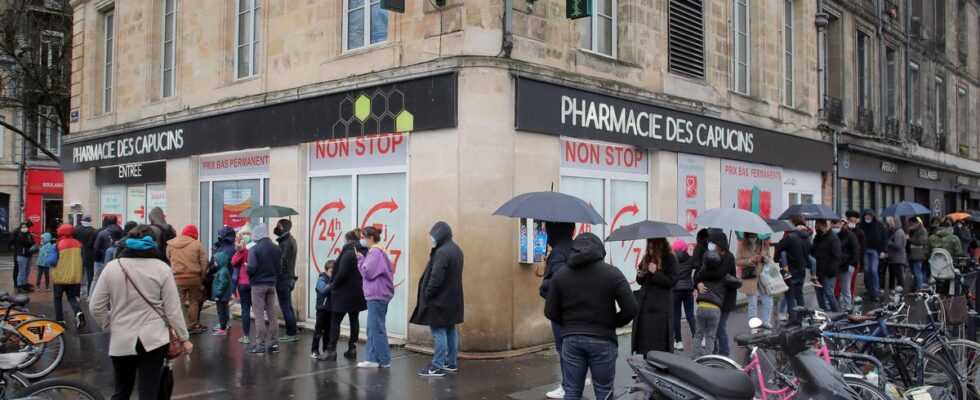Lhe five scientists who spoke this Thursday morning from the ANRS Emerging Infectious Diseases in Paris, to share their current knowledge of the epidemic situation are all researchers, among the most advanced in France.
Not necessarily microphone professionals, nor TV studios, they release data, curves, figures, statistics that they analyze and comment on. We are neither in the prediction, nor in the communication, but in the factual and the science in progress. Small steps in this case.
Lhe five scientists who spoke this Thursday morning from the ANRS Emerging Infectious Diseases in Paris, to share their current knowledge of the epidemic situation are all researchers, among the most advanced in France.
Not necessarily microphone professionals, nor TV studios, they release data, curves, figures, statistics that they analyze and comment on. We are neither in the prediction, nor in the communication, but in the factual and the science in progress. Small steps in this case.
If we summarize in a few sentences the two hours that this conference lasted, the certainties are thin. The peak of the epidemic will occur next week, middle or end “which does not mean, however, the peak of hospitalizations, notes Yazdan Yazdanpanah, director of the ANRS and infectiologist. Because, in addition to hospital admissions for Covid, all the other winter pathologies are added. »
Two doses of vaccine are ineffective against Omicron after six months and only the third dose provides protection. Odile Launay, professor of infectiology at the Cochin hospital attests to this, as does Arnaud Fontanet, epidemiologist. However, the relevance of a fourth dose is not on the agenda.
The third dose protects
“We have all the data concerning the duration of effectiveness of the vaccines, notes Professor Launay. Faced with the Delta variant, the efficacy drops to between 70 and 90% six months after the first two injections. The third dose of booster restores this effectiveness. On the other hand, for Omicron, the loss of effectiveness is total, but the third dose also restores it. Both Moderna and Pfizer perform equally well on this recall. »
France is lagging behind on this booster dose, since “only” 75% of over 65s have done so, against 90% of over 65s in England, in particular.
Ultimately, we can hope that SarsCov2 will transition to a seasonal epidemic, and that it will just take an annual booster vaccine for the most fragile.
Vittoria Colizza, research director at INSERM and specialist in infectious disease modeling, analyzes the figures from the epidemic. With regard to hospitalizations, she notes: “Certainly hospital admissions are still very high, but faced with the rapidity of Omicron infections, the majority variant in France at present, the gap between the number of infected and these hospital admissions is huge. »
Explanation of the epidemiologist of the Institut Pasteur Arnaud Fontanet: “A patient infected with Omicron has three times less risk of being hospitalized than if he is infected with a Delta. Omicron divides severe forms in hospital by four, as for the duration of hospitalization with Omicron, it is four days on average compared to eight with Delta. »
Probable new variants
The scientists confirm the effectiveness of the three doses of vaccine, point out that the transmissibility of the virus when one is vaccinated is less than if one is not, but do not call for a fourth dose in the general population, for the instant.
“No data in the countries that have already implemented it is completely conclusive,” they say. Can we bet on a vaccine against Omicron? “It is already manufactured by manufacturers, as was the vaccine against the Beta variant which did not finally spread. Today we do not know if a vaccine against Omicron would be appropriate. »
Many questions therefore, in the face of future strategies, but Arnaud Fontanet suggests a course of action to keep the outbreak of Omicron at bay: “By reducing social contacts, we see a drop in the number of infections, he says. We must stop betting on a hypothetical herd immunity. On the other hand, it suffices to reduce our contacts by 20% to halve the number of hospital admissions. Couldn’t we bet instead on the self-regulation of individuals? »
While all agree that the peak of the Omicron epidemic is next week, they are more skeptical that this Omicron variant is the last in the series. “The mechanisms for the emergence of variants are multiple,” remarks Odile Launay. We’re going to have new variants, but not all of them will cause an epidemic. “” The good news, continues Arnaud Fontanet, is that as SarsCov2 variants emerge, we strengthen our cellular immunity which protects against severe forms. So in the long term, we can hope that SarsCov2 transitions to a seasonal epidemic, and that it will just take an annual booster vaccine for the most vulnerable. This is the most likely scenario. But we don’t have a timetable. Let’s say a horizon between one and five years… ”
